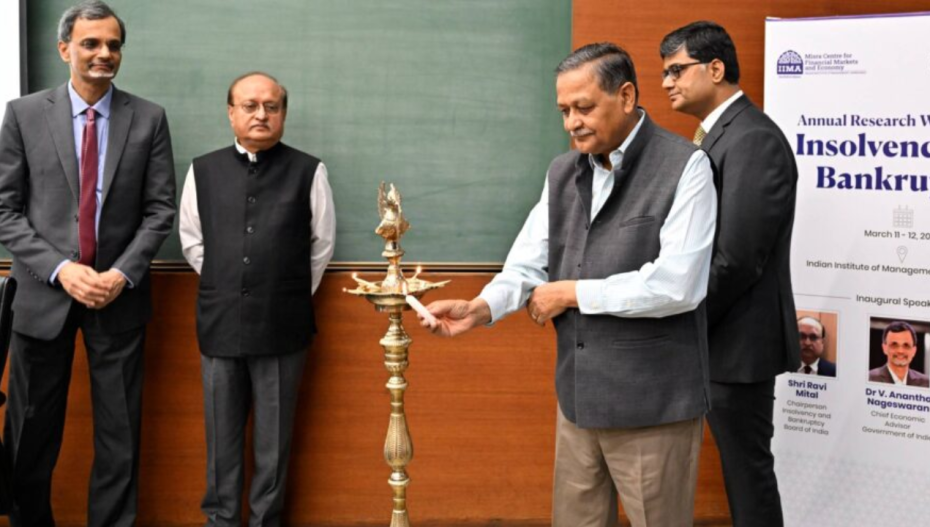The second edition of the Annual Research Workshop on Insolvency and Bankruptcy concluded successfully at the Indian Institute of Management Ahmedabad (IIMA) on Sunday. Organised by the Misra Centre for Financial Markets and Economy at IIMA, in collaboration with the Insolvency and Bankruptcy Board of India (IBBI), the two-day event brought together leading experts, insolvency professionals, researchers and members of academia to explore the evolving landscape of insolvency and bankruptcy in India.
The inaugural session, held on Saturday, was attended by prominent personalities including Professor Satish Deodhar, Dean (Faculty), IIMA; Chief Justice (Retd) Ramalingam Sudhakar, President of the National Company Law Tribunal (NCLT); Ravi Mital, Chairperson, IBBI and Avinash Desai, Senior Advocate at the Telangana High Court.
The workshop aimed to assess the challenges and opportunities faced by insolvency professionals in India’s insolvency ecosystem, delve into the profession’s interaction with various stakeholders and draw insights from global best practices. It was spearheaded by IIMA faculty members Professor M P Ram Mohan and Professor Balagopal Gopalakrishnan.
In his welcome address, Professor Satish Deodhar, Dean of Faculty at IIMA, expressed his enthusiasm about the workshop and its potential to foster meaningful discussions. “We hope that this workshop provides invaluable insights for all stakeholders, contributing to a deeper understanding of India’s insolvency ecosystem,” said Deodhar.
The inaugural address was delivered by Chief Justice (Retd) Ramalingam Sudhakar, who highlighted the importance of the Insolvency and Bankruptcy Code, 2016 (IBC) in shaping the insolvency landscape in India. He urged researchers to formulate a long-term roadmap for the IBC, recommending a comprehensive 10-year action plan from an independent perspective to ensure the code’s continued effectiveness and relevance.
“The IBC has created a unique ecosystem. India’s insolvency jurisdiction is much ahead of other countries. Looking to the future, we would like to chart out a 10-year plan from an independent third-party perspective. This plan would outline the roadmap for future amendments and improvements to the code, ensuring its continued relevance and effectiveness,” stated Sudhakar.
Ravi Mital, Chairperson of IBBI, underscored the role of such conferences in shaping policymaking. He mentioned that, “We take these conferences very seriously and carefully listen to researchers and their insights, which helps us in policymaking. We note every suggestion that is made during paper presentations, then review these suggestions and evaluate their potential for implementation.”
He also highlighted the achievements of the IBC and its impact on various sectors, including the Indian credit market, steel industry and real estate sector.
Avinash Desai, Senior Advocate at the Telangana High Court, emphasised the transformative effect of the IBC on India’s economic landscape, stating, “IBC has changed the Indian economic and financial landscape providing a streamlined, time-bound, and creditor-driven mechanism to solve corporate distress. Before its enactment, India’s insolvency resolution process was sluggish, inefficient, and heavily skewed in favour of defaulters, leading to significant delays and poor recovery rates. The IBC has significantly improved this and has instilled credit discipline, improved investor confidence, and even strengthened India’s ease of doing business ranking.”
He also shared insights into international best practices that could be adapted for India, while stressing the importance of addressing emerging challenges to ensure the IBC remains effective.
The inaugural session was followed by a panel discussion on “Assessing the Insolvency Profession,” which featured experts such as Rahul Madan, Managing Director of the Indian Institute of Insolvency Professionals of Institute of Chartered Accountant Of India (ICAI); Shiv Anant Shanker, Chief General Manager at IBBI; G S Narasimha Prasad, Managing Director of the Insolvency Professional Agency of ICAI; and CA Sunit Shah, Insolvency Professional at SKYZ & Co. Chartered Accountants.
The panel delved into the evolution of the insolvency profession, the role of Insolvency Professional Agencies (IPAs) and the challenges faced by insolvency professionals.
Also Read: After Multiple Wake Up Calls, Gujarat Govt Rolls Out 24/7 PM-JAY Helpline













